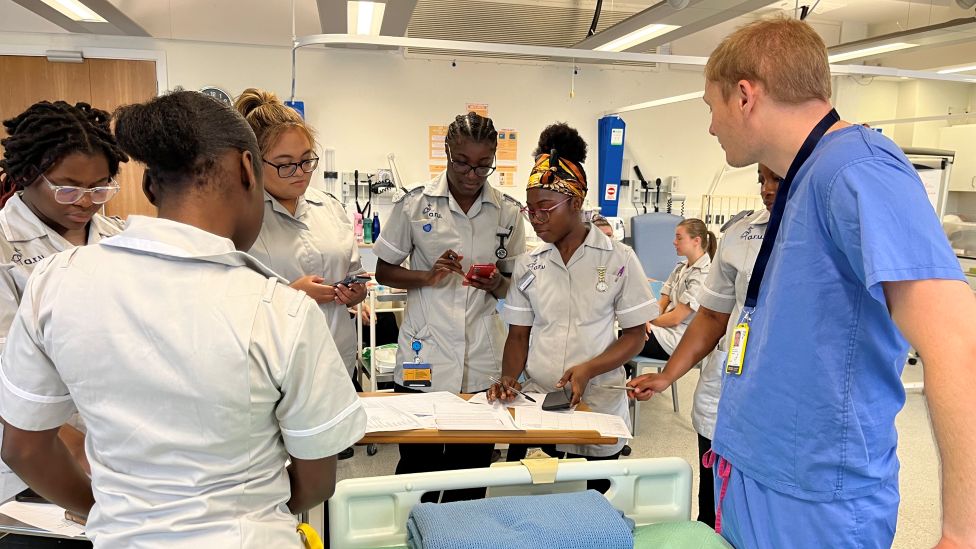ARTICLE AD BOX
 Image source, Shaun Whitmore/BBC
Image source, Shaun Whitmore/BBC
Anglia Ruskin University said application nurses courses rose during the pandemic but had now decreased
By Nikki Fox & Pete Cooper
BBC Look East & BBC News
The UK's biggest provider of healthcare courses said seeing nurses "tired" and on strike had led to a fall in applications by almost a quarter.
Anglia Ruskin University (ARU) trains about 1,000 nurses a year and said a rise from the pandemic had dropped off.
The Department of Health said it was on track to recruit 50,000 nurses by March 2024, but many have come from abroad.
Louise Jenkins, from ARU, said it wanted "local people to come and train and stay local".
Applications to nursing courses at ARU were just over 2,000 in 2020, and rose by about 50% to just over 3,000 in 2021.
There was a small decrease in 2022, but applications dropped to 2,169 this year, a 23% decrease from last year, across their campuses in Cambridge, Peterborough and Chelmsford.
Figures from the admissions service Ucas show a similar pattern with applications rising from 2019 to 2022, but returning to pre-pandemic levels this year.
'We need lots of nurses'
Image source, Shaun Whitmore/BBC
Image caption,Louise Jenkins from ARU said she was working with local schools to encourage people to apply to nursing courses
Ms Jenkins, ARU's head of school for nursing and midwifery, said: "People have seen that nurses and other healthcare workers are getting tired.
"They're seeing things, such as strikes on the news and so we have seen a decrease in applications by about 20% in the last year.
"It is a real shame that people are not applying, we do need nurses to do the training."
Ms Jenkins said the drop this year was "something that we expected after the pandemic... but we wouldn't want to see that trend continue".
She said: "We know that we have an ageing population and we know that we need lots of nurses going forward.
"It's been fantastic that lots and lots of nurses have come in from abroad. But we also want local people to train because those are people that are not going to want to go back to their own country and their own families."
'Smaller pool of nurses'
Image source, Shaun Whitmore/BBC
Image caption,Chief nurse at Addenbrookes Hospital, Lorraine Szeremeta, said the growth in the NHS meant more nurses were needed
Lorraine Szeremeta, chief nurse at Addenbrooke's Hospital in Cambridge, said the "demand for nursing is increasing" across the NHS.
There was also a particular need at Addenbrooke's as it is opening more wards and theatres to deal with the pandemic backlog.
She said there was a particular issue with the cost of working and living in Cambridge, which "makes it difficult for [nurses] to continue their career with us, so that is definitely something that we're working on".
"I think there's definitely a smaller pool of nurses for us to call on and with increased demand everywhere," she said.
Ms Szeremeta said the hospital had "to do everything we can to be attractive to newly qualified nurses" and was also training staff already living and working in Cambridge as nurses.
'You will never be bored'
Image source, Shaun Whitmore/BBC
Image caption,Nurse Sara Dennis says it is a excellent career to get into
Sara Dennis, from Cambridgeshire, is a newly qualified nurse working on the teenager cancer unit at Addenbrooke's.
The 49-year-old said nursing was "something I always wanted to" but only just recently completed her course at Anglia Ruskin.
She said: "It's absolutely amazing, it's been everything and more... I feel it's a real privilege to be allowed into people's lives when they're scared or poorly or vulnerable."
Ms Dennis admits the strain the NHS was under during the pandemic and the recent strikes "may have put people off" nursing.
"But for me personally, working through the pandemic, I have learned so many skills that I would never have had before," she said.
She said getting more nurse into the NHS was "really important... and there are so many different avenues in nursing you can go down that you will never be bored".
A Department of Health and Social Care spokesperson said there was "strong interest in nursing and midwifery careers, with applications above 2019 levels".
They said eligible students would also "benefit from training grants of at least £5,000 a year".
"We are on track to meet our commitment of 50,000 more nurses, with 44,000 more working in the NHS compared to September 2019, and will soon publish a long-term workforce plan focused on recruiting and retaining more staff," they added.
Follow East of England news on Facebook, Instagram and Twitter. Got a story? Email eastofenglandnews@bbc.co.uk or WhatsApp us on 0800 169 1830
Related Internet Links
The BBC is not responsible for the content of external sites.

 1 year ago
45
1 year ago
45








 English (US) ·
English (US) ·